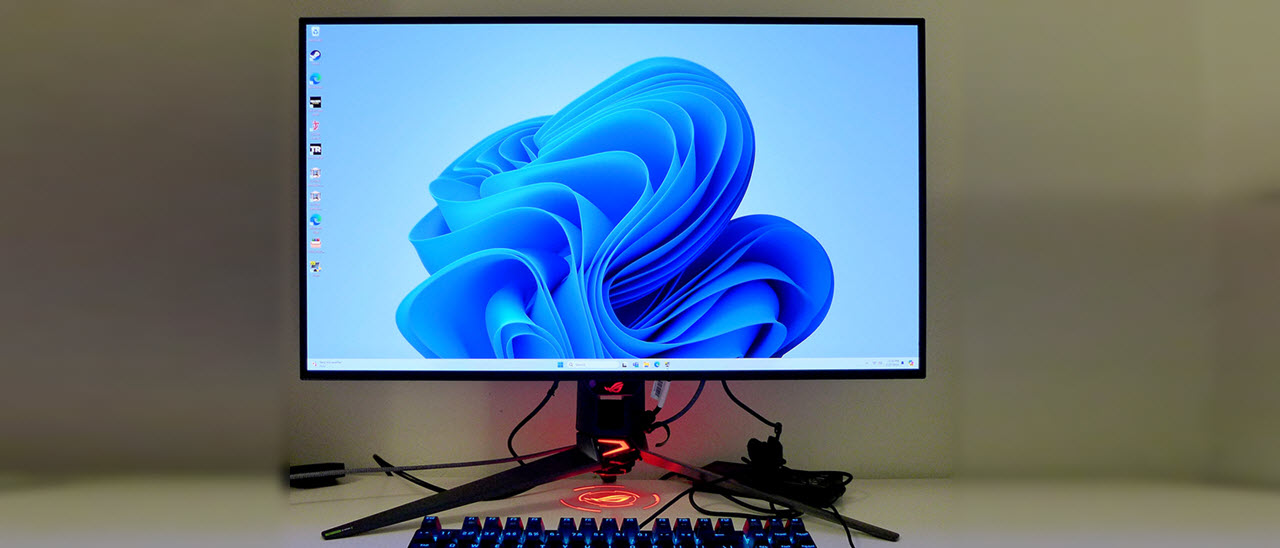Why you can trust Tom's Hardware
The PG32UCDP includes a factory calibration data sheet for each sample, and I was able to verify Asus’ results in my tests. In fact, it measured a little better.
Grayscale and Gamma Tracking
Our grayscale and gamma tests use Calman calibration software from Portrait Displays. We describe our grayscale and gamma tests in detail here.
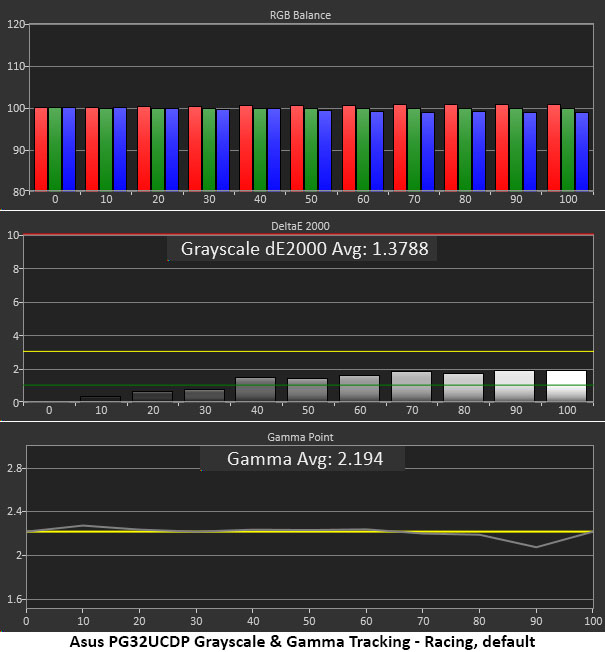
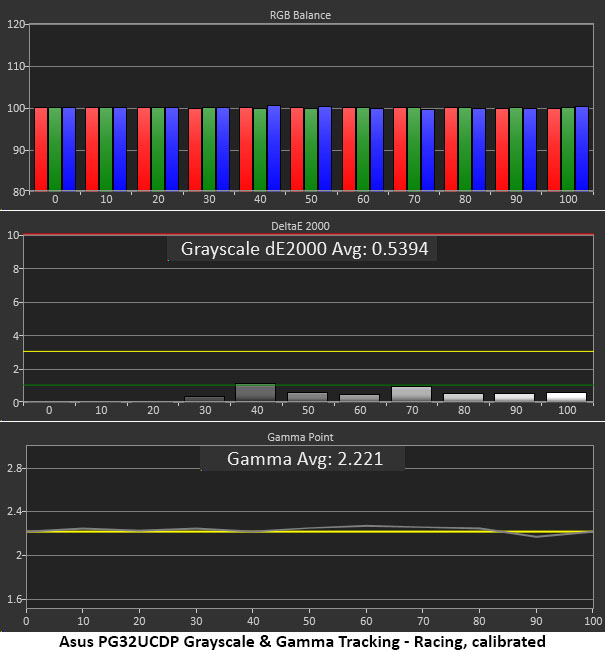
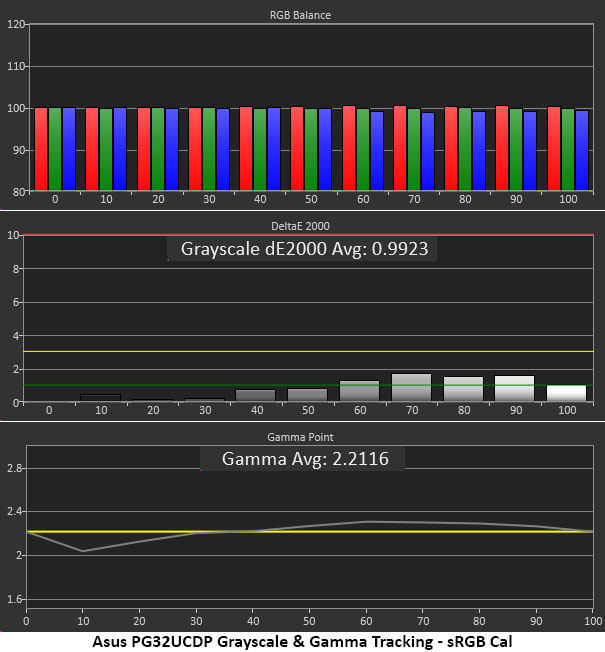
The PG32UCDP’s Racing mode shows grayscale errors all under 2dE, which meets Asus’ claim. The only thing I noticed here was a slight dip in the gamma trace at 90% brightness. This means that the luminance value is too high but only slightly.
Calibration is certainly not necessary, but I did one anyway and found a small improvement in the numbers. All grayscale errors are now under 1dE, and the gamma issue has been resolved. This is reference-level performance.
In the sRGB Cal mode, grayscale tracking has no errors above 2dE, but gamma is less precise. There is a dip at 10%, which makes some shadow areas a little brighter and the remaining values are a bit low. In practice, this issue is hard to spot. The PG32UCDP is qualified for color grading.
Comparisons
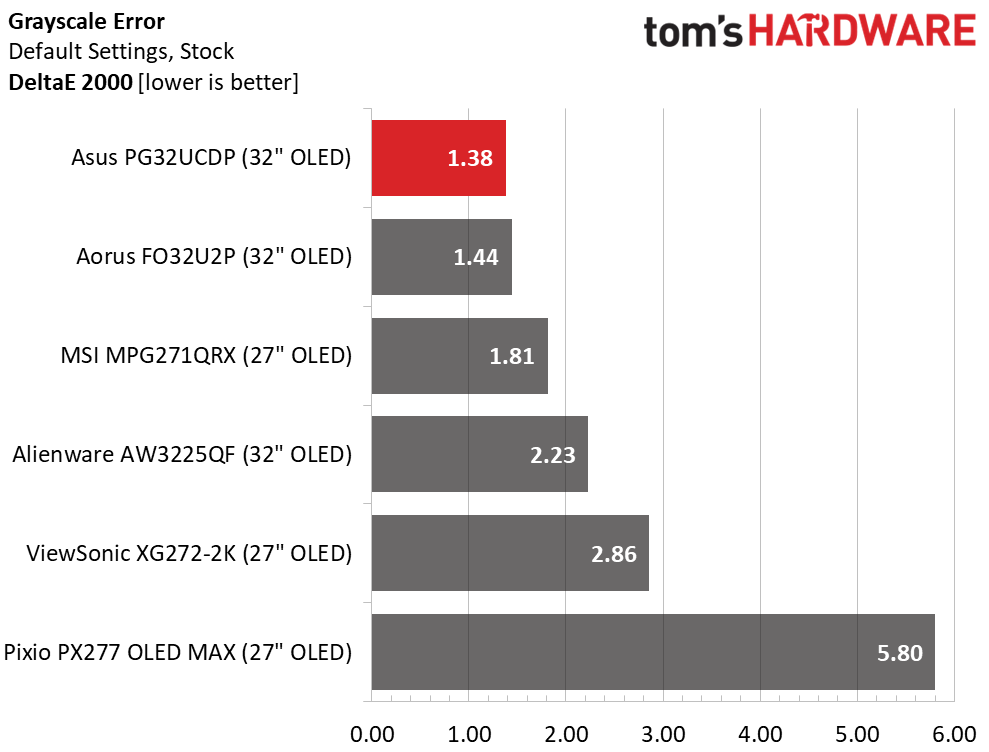
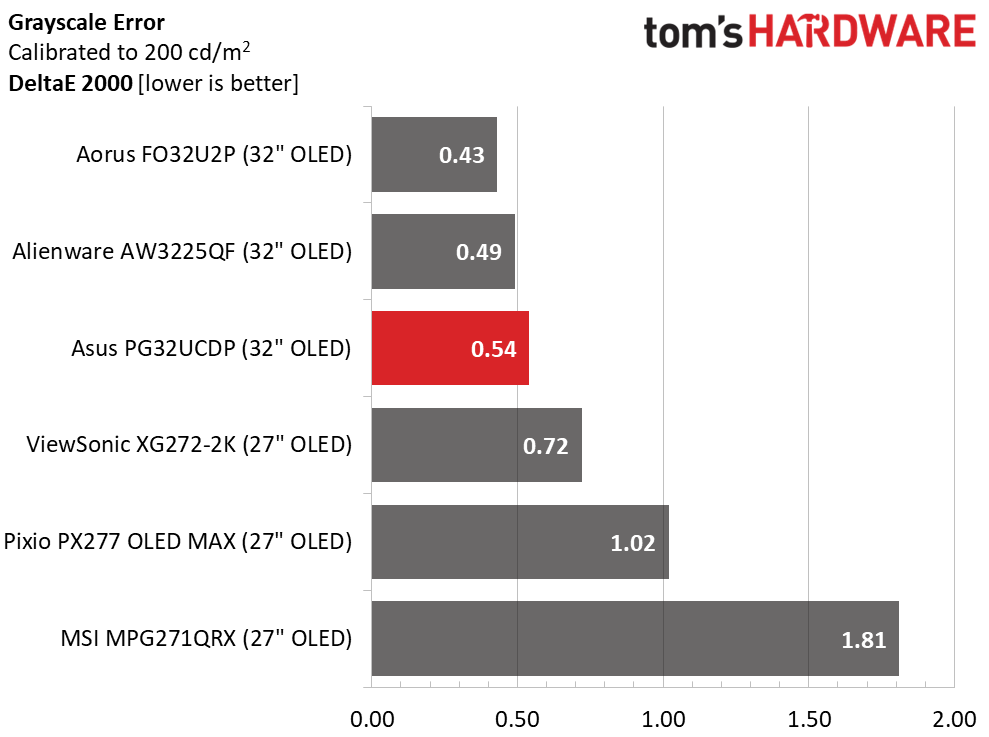
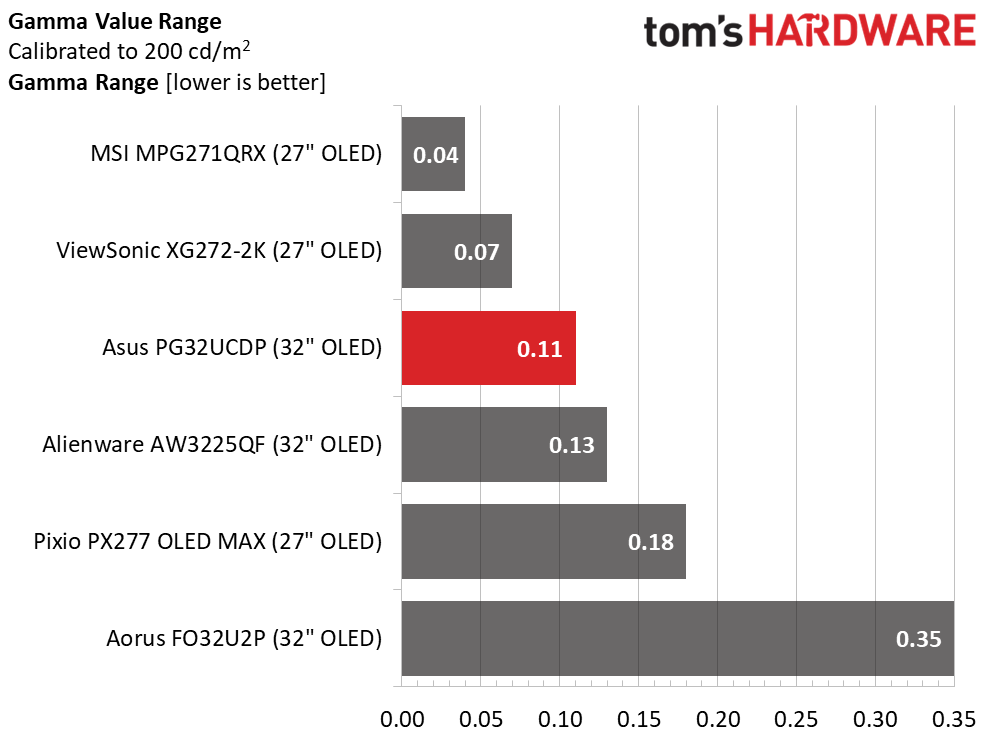
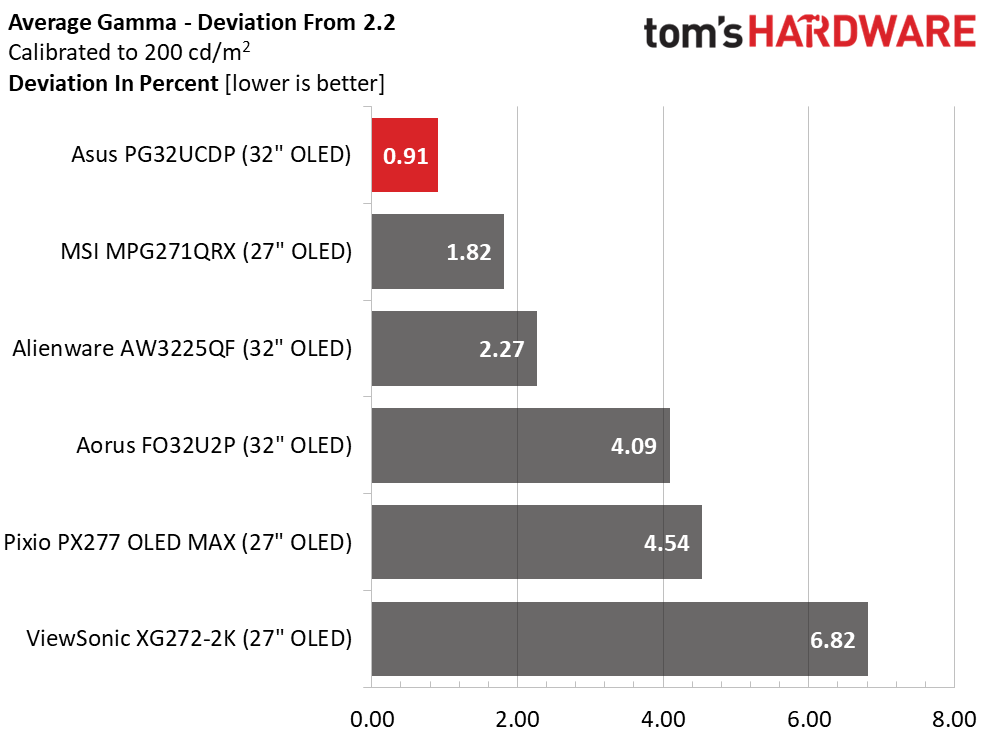
The PG32UCDP wins the out-of-box contest for grayscale tracking with a 1.38dE score. After calibration, that drops to 0.54dE, which is about as good as it gets. You can see excellent results from all the OLEDs here.
Gamma values are also tight for all the monitors, with the PG32UCDP coming in third place in the range test, and first for its deviation from the 2.2 reference. This is in Racing mode with my calibration in place. This is the performance I’d expect from a premium gaming monitor.
Get Tom's Hardware's best news and in-depth reviews, straight to your inbox.
Color Gamut Accuracy
Our color gamut and volume testing use Portrait Displays’ Calman software. For details on our color gamut testing and volume calculations, click here.
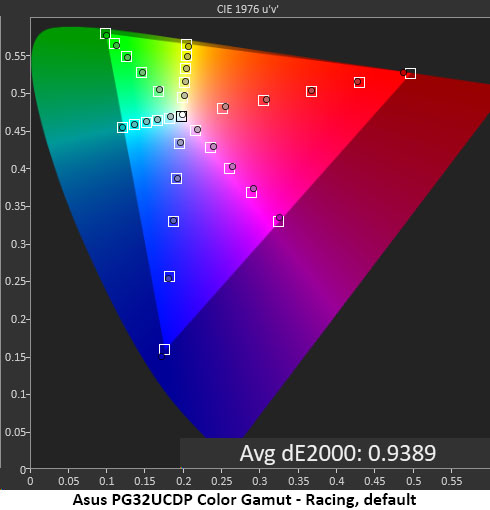
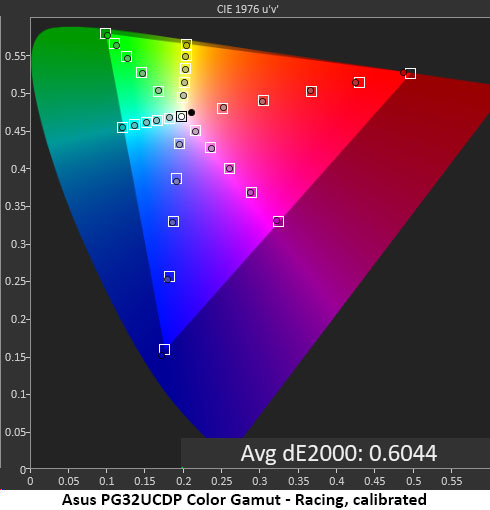
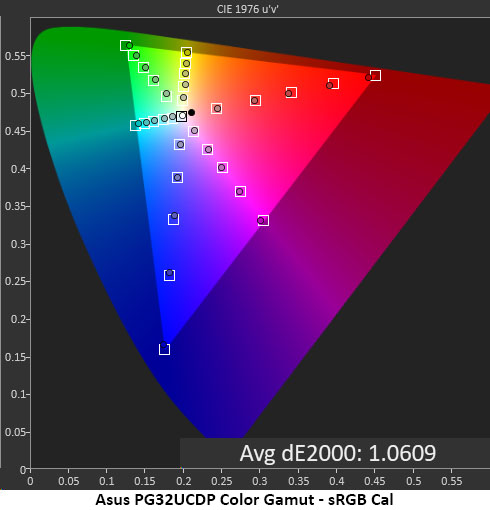
The PG32UCDP’s gamut results are just as impressive as what I saw above. In Racing mode, the full native gamut is used which covers over 97% of DCI-P3. It hits every target and is only a tad shy of 100% red. The average error is just 0.94dE. Any monitor that comes in under 1dE in this test is considered reference level. My calibration improves the numbers a tad but makes no difference visually. The sRGB result is the same with a 1.06dE average, also reference level.
Comparisons
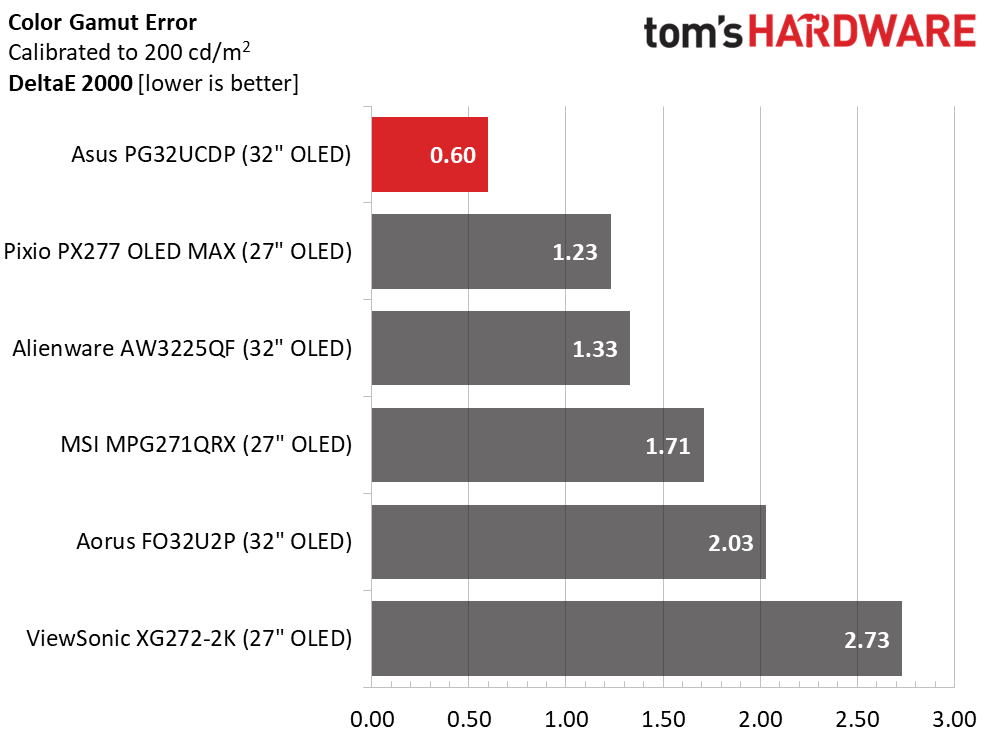
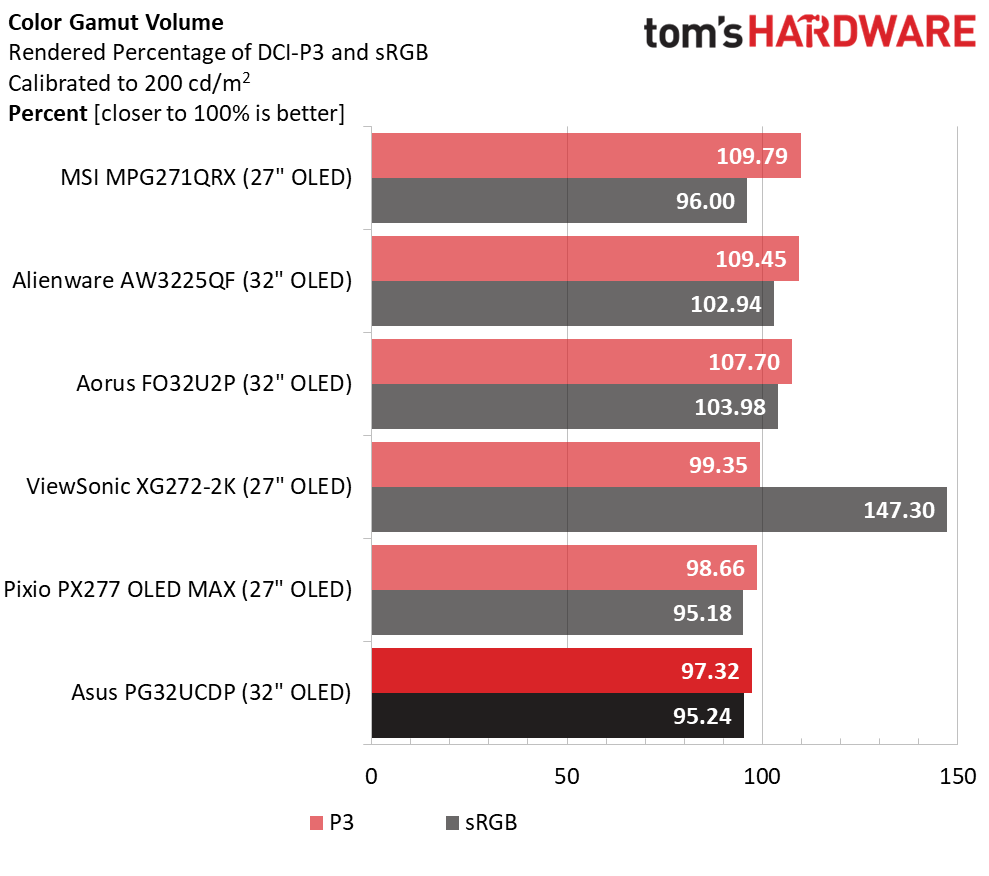
The PG32UCDP wins the gamut accuracy test whether it’s calibrated or not. It doesn’t get better than that. It has visually perfect color in the DCI-P3 and sRGB realms.
In the volume calculation, you can see which monitors have Quantum Dot tech and which do not. The PG32UCDP is in the latter category. It’s a tad behind the Pixio and ViewSonic, but visually, those three monitors look the same. The top three do look a bit more colorful, especially in red and green, where they have greater saturation. But the price for that is lower brightness. WOLEDs like the PG32UCDP are brighter by nature.
Test Takeaway: If you want the most possible color, a QD-OLED is the way to go. However, if you want perfect accuracy and high brightness, the PG32UCDP is the best choice. It doesn’t need calibration, and it has a high peak output level. OLED as a technology is impressive in my color tests but the PG32UCDP is one of the best I’ve seen yet.
MORE: Best Gaming Monitors
MORE: How We Test PC Monitors
MORE: How to Buy a PC Monitor
MORE: How to Choose the Best HDR Monitor
Current page: Grayscale, Gamma and Color
Prev Page Brightness and Contrast Next Page HDR Performance
Christian Eberle is a Contributing Editor for Tom's Hardware US. He's a veteran reviewer of A/V equipment, specializing in monitors. Christian began his obsession with tech when he built his first PC in 1991, a 286 running DOS 3.0 at a blazing 12MHz. In 2006, he undertook training from the Imaging Science Foundation in video calibration and testing and thus started a passion for precise imaging that persists to this day. He is also a professional musician with a degree from the New England Conservatory as a classical bassoonist which he used to good effect as a performer with the West Point Army Band from 1987 to 2013. He enjoys watching movies and listening to high-end audio in his custom-built home theater and can be seen riding trails near his home on a race-ready ICE VTX recumbent trike. Christian enjoys the endless summer in Florida where he lives with his wife and Chihuahua and plays with orchestras around the state.
-
husker This looks very nice and I'm in the market. Thanks for the in-depth review. I would include the $1200 price as a con, however. You might say that the price is quite fair for an OLED monitor with these features and I'm in no position to argue. But $1200 is still an entry barrier for many people, regardless. You might also say you review monitors, not prices, and I would agree again. But still... $1200 is a big chunk of change and it needs to factor in somewhere.Reply -
Roland Of Gilead Yes, I agree. It's a nice monitor. I too will be looking for something like this down the line, but first wanna upgrade my GPU.Reply -
DavidLejdar Reply
Then again, when you put it into a category of 4K 240Hz OLED (or similar OLED), what other monitors are there to compare prices with? E.g. the Asus ROG Swift PG42UQ, which is (still) listed as "Best OLED 4K Gaming Monitor" in Tom's best 4K monitor list, doesn't seem to come cheaper. Nor does the as "Best 4K Gaming Monitor" listed Gigabyte Aorus FO32U2P. And so on.husker said:This looks very nice and I'm in the market. Thanks for the in-depth review. I would include the $1200 price as a con, however. You might say that the price is quite fair for an OLED monitor with these features and I'm in no position to argue. But $1200 is still an entry barrier for many people, regardless. You might also say you review monitors, not prices, and I would agree again. But still... $1200 is a big chunk of change and it needs to factor in somewhere.
But there sure are cheaper monitors. Personally, I am likely to upgrade to 4K, at least 32'', at some point. And I could justify the price tag - when counted across e.g. 6 years, it comes down to less than $20 per month. Not sure about how well the technology advanced to prevent image retention (and then burn-in) on OLEDs though. Which is why I may stay with LCD (such as IPS and VA), which come cheaper in particular at the 144Hz range. -
oofdragon Nah. 32 inch doesn't make sense for 4K, 40+ does. Give me a 42" 4K 240Hz with 480Hz FHD and then we r talking. While it doesn't happen any 240Hz 27" is pretty much the same as this but at half the priceReply -
helper800 Reply
I disagree. 32" is perfect for me. No curve either.oofdragon said:Nah. 32 inch doesn't make sense for 4K, 40+ does. -
vijosef Reply
Theoretically. But if we were to trust theories, we would not be reading reviews.helper800 said:Its OLED, so there is virtually none to be had. -
helper800 Reply
Here is a review of the exact same panel in LG's implementation. Enjoy!vijosef said:Theoretically. But if we were to trust theories, we would not be reading reviews. -
UnforcedERROR Reply
Then buy a TV???oofdragon said:Nah. 32 inch doesn't make sense for 4K, 40+ does. Give me a 42" 4K 240Hz with 480Hz FHD and then we r talking. While it doesn't happen any 240Hz 27" is pretty much the same as this but at half the price
This monitor isn't marketed for you. It's for people who want the best of everything: reasonable size, PPI, and performance.
42" is larger than most people have desk space for, and you'd need to sit back from it anyway. Your current dream monitor is an extremely niche product.
